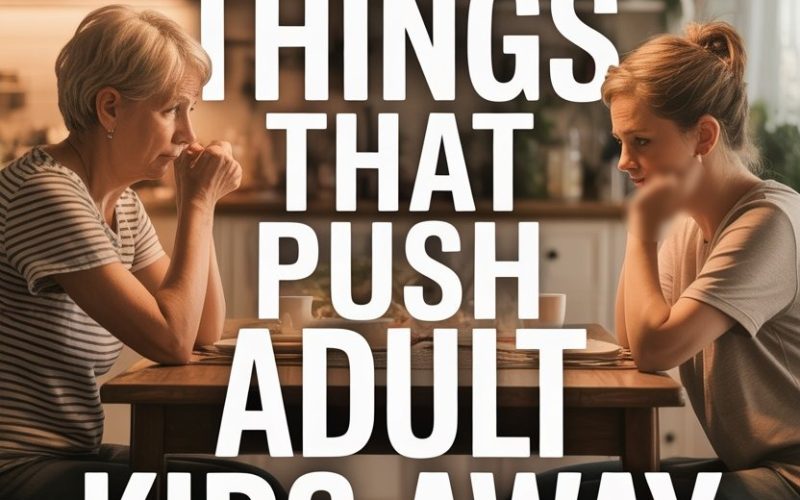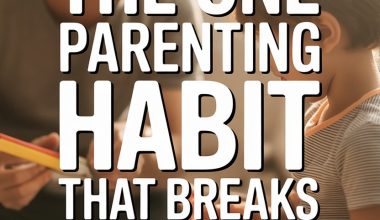Some days, you blink and your baby is suddenly critiquing your Wi-Fi password, living in another postcode, and texting you back with exactly three words (and a suspicious number of periods).
The years between soccer practice and adult independence fly by, often leaving parents scratching their heads and wondering, “Did I do something wrong?”
Maybe. Maybe not.
But there are a few classic parent moves that send grown kids sprinting for the hills faster than you can say “Sunday roast.” A bit of honest reflection (and a pinch of humility) can work wonders.
If you’ve noticed your adult kids keeping their distance—or if you simply want to keep your bond strong—read on.
1. Micromanaging Their Lives
It’s tempting.
You spent decades ensuring they brushed their teeth, wore clean underpants, and didn’t lick electrical sockets. Now they’re paying bills and, with any luck, flossing of their own free will.
Still, your hands itch to course-correct their choices: relationships, jobs, what they do with their Friday nights.
Micromanaging adult children sends a clear message: “I don’t trust you to steer your own ship.” And yes, sometimes you truly don’t trust them. That’s tough.
But grown children need space to make their own mistakes—and (miracle of miracles) their own triumphs.
A research found that over-involved parents can unintentionally smother adult kids, leading to resentment and withdrawal. You might think you’re helping; often, you’re accidentally training them to keep things secret.
What helps: Offer advice only when asked (or, at the very least, preface with, “Do you want my two cents?”) Trust that your adult children are capable—because whether they sink or swim, they’ll learn either way.
And yes, sometimes you need to let them buy the dodgy second-hand car just to prove that it was, in fact, dodgy.
2. Unsolicited Judgments and Critiques
You know the sort of thing: “Are you really wearing that to the office?” or “Don’t you think it’s time to lose a little weight?” Even the most well-intentioned remarks can sting like lemon juice on a paper cut.
Adult kids are hypersensitive to criticism from parents—even the grown-up, mortgage-paying ones.
Your “helpful hints” about their parenting, their partner, or their life choices often don’t land as intended. Instead of constructive dialogue, it breeds defensiveness, shame, and a sudden urge to avoid family group chats.
A study published in NLM found that perceived criticism from parents predicts less contact and lower relationship satisfaction in adult children.
Turns out, they’d rather fold laundry with a porcupine than subject themselves to a running commentary on their life.
Try this: If you must give feedback, dial it way, way down. Stick to open-ended questions. Swap “You should…” for “How do you feel about…?”
And if your tongue is burning with a red-hot opinion, consider swallowing it—just this once.
3. Treating Them Like Kids, Not Equals
The urge to call your thirty-something daughter “pumpkin” in front of her mates may be irresistible, but tread carefully.
Adult kids want respect, autonomy, and to be treated as equals, not as gangly adolescents who can’t be trusted with a set of house keys.
Clinging to your parental authority after your kids have reached adulthood can backfire spectacularly.
It’s not just embarrassing (although it absolutely is when you insist on introducing them as your “baby” at the annual BBQ). It’s a signal that you haven’t quite accepted their growth.
The Harvard Study of Adult Development suggests that mutual respect forms the foundation of lasting parent-adult child relationships.
And mutual respect doesn’t involve double standards or infantilizing pet names (at least not in public).
What works: Ask for their opinions on big decisions. Share your own struggles (you don’t have to be a superhero).
Treat them as the capable adults they are—even if, deep down, you’ll always see them wearing superhero pyjamas and jelly sandals.
4. Guilt-Tripping and Emotional Blackmail
Ah, the classic: “I carried you for nine months, and not even a phone call?” Guilt is a powerful motivator—if your goal is to inspire avoidance, that is.
When parents pile on the guilt, adult kids learn to associate family time with obligation, not connection.
It’s true: Some kids will visit just to keep the peace. But they’re counting down the minutes until they can escape to their own sofa and decompress in blessed, guilt-free silence.
Research published in Philosophy and Phenomenological Research highlights that repeated guilt-tripping causes strain and emotional distance. It’s tough to build a loving, honest relationship when every interaction comes loaded with strings.
Try instead: Express genuine joy when they do reach out. Focus on the positive moments.
If you’re feeling lonely, say so directly—without the melodrama. “I miss you; it’d be great to catch up soon” lands far better than “I suppose you’re just too busy for your old mum.”
5. Not Respecting Boundaries (Physical, Emotional, Digital)
Boundaries are the unsung heroes of healthy adult relationships. Ignore them, and you’ll find your offspring mysteriously “busy” every time you suggest catching up.
Whether it’s turning up unannounced (“I was just in the neighbourhood!”), snooping through their things, or peppering them with questions about their dating life, boundary-busting behaviour pushes adult kids away, fast.
The Cleveland Clinic points out that respecting boundaries lays the groundwork for trust and comfort. Overstepping—physically or emotionally—sends a message that you still see them as your turf to manage.
What to try: Ask permission before visiting or offering advice. Don’t expect a play-by-play of their relationships, work drama, or therapy sessions.
And resist the urge to “just check” what they’re up to on social media—unless you’re prepared for them to block you faster than a spam call.
For digital boundaries, yes, that means waiting for a reply to your WhatsApp message rather than sending a series of increasingly anxious follow-ups (“Are you alive?!” “???” “Did you get eaten by a crocodile?”). No news is often good news.
Keep Your Door—and Your Mind—Open
It’s tough, this business of loving grown children.
The rules change, sometimes overnight. You’re still needed—but not in the same ways as before. Sometimes you’ll get it wrong, and that’s okay too.
The strongest families aren’t the ones who never hurt each other. They’re the ones who listen, adapt, and apologise when necessary.
Start with a little self-awareness—and, as much as possible, a sense of humour.
Your adult kids will notice, and maybe (just maybe) they’ll start calling a bit more often. Even if it’s just for your Wi-Fi password.




